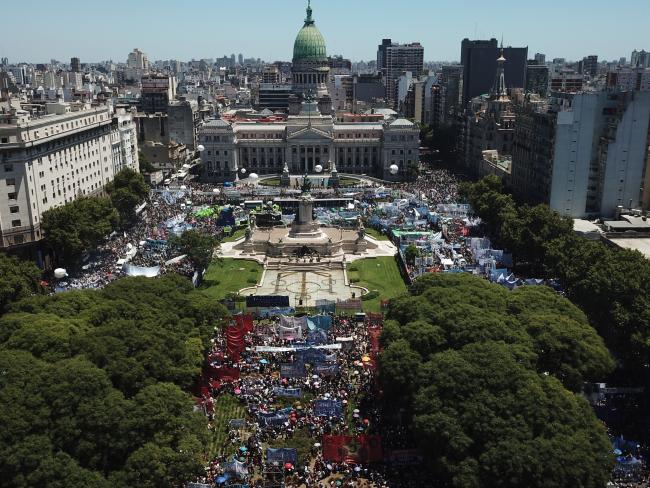
Leer el artículo en español.
After only 45 days in office, the current Argentine president, Javier Milei, faced a massive popular mobilization against his policies. On January 24, close to 200,000 people in the city of Buenos Aires and half a million throughout the country protested against a bill known as the “omnibus law.” On this day of protest, and for the first time in the history of the Argentine workers' movement, the three main trade union confederations called upon cultural organizations to protagonize the march. The resistance of the cultural sector in the streets was overwhelming from the moment the first measures of the new government were announced. This prompted them to join the march as a sector identified with a large banner that read “CULTURE," something that had never happened in Argentina before.
At an organizational meeting held on January 16 at the General Confederation of Labor (CGT), CGT General Secretary Héctor Daer explained how important the sector was, "not only because they are a large and very diverse group, but also because they have a solid organization."
"For the first time in history the cultural sector marches together with the General Confederation of Labor," said filmmaker Adrian Jaime while marching on January 24. As a member of the Cine Argentino Unido collective, he was one of the organizers of the large cultural presence in the mobilization.
The transdisciplinary collective contributed not only to the active resistance, but also to the traditional drum beats of the unions, whose syncopation gives rhythm to the marches. The cultural sector incorporated carnival masks, performance, dances, and colorful artwork. They took to the streets with the conviction of a powerful tool for resistance: expression with the joy that art produces by encountering community in the streets.
The popular international award-winning writer Claudia Piñeiro joined the mobilization along with popular artists such as Nacha Guevara, the singer and performer who 60 years ago actively participated in countercultural experiences and resistance to dictatorships. "The mobilization is extremely valuable, we are a people who have always demonstrated in the streets peacefully and that is something we will continue to do," said Piñeiro about the protest.
Collective Organization that Emerged from Past Struggles
The cultural organization first emerged in 2022, when the sector decided to organize under the slogan: #NoAlApagónCultural (No to the Cultural Blackout). This was the hashtag under which the movement coalesced and succeeded in protecting state investments in culture. The hashtag was taken up again in recent months after the arrival of the new government in Argentina, led by the right-wing libertarian Milei.
Back then, artists from different disciplines, cultural administrators, and activists from all over the country gathered to block the implementation of a conservative proposal made by then-president Mauricio Macri. In 2017, Macri decided that all public funding laws for the arts and culture would expire in 2022. This entailed the termination of funding for cultural activities such as audiovisual production, theater, the National Institute of Music, popular libraries, and community and Indigenous radio stations. In the fight for a law to protect cultural funds, the movement became one of the most active political agents against reforms that would have profoundly impacted Argentina at the time. The hashtag became a sign of resistance that still endures today.
"The attack on culture is financial and ideological," said Patricia Herrera, president of the Federal Council of Culture, the national body that represents the provinces within the National Secretary of Culture. "It is a dangerous discourse to denounce that tax money is 'wasted' on aesthetic work without substance, and that [cultural work] should demonstrate its profitability or be eliminated outright."
During his presidential campaign in late 2023, Milei announced that he would dismantle or defund public cultural institutions. These include the Institute of Cinema and Audiovisual Arts (INCAA), the National Theater Institute (INT), the National Institute of Music (INAMU) and public media, among others.
At the end of December, after taking office, Milei sent to Congress a bill called "Ley de Bases y Puntos de Partida para La Libertad de los Argentinos" (Law of Bases and Starting Points for the Freedom of Argentines): a 664-article bill of which more than 300 laws were annulled or modified.
A bill of this nature had no precedent in the history of the country: it sought to allow the president to pass laws without the participation of Congress during the four years of his term in office, enabling him to sell all public companies, modify the regime for the production and export of energy resources, and discourage investment in industrial development. In addition, the bill proposed to eliminate regulations on the use of airspace and the communications spectrum, among many other modifications to the Argentine legal system. Hundreds of laws that took considerable debate to be approved, would have been altered with only two months of parliamentary discussion.
Regarding cultural matters, the law proposed to dismantle almost in its entirety the current system of cultural promotion. It ordered for the closure of two major institutions: the National Theater Institute (INT), which promotes theater production throughout the country; and the National Fund for the Arts (FNA), which grants subsidies for artistic creation and training. FNA funds were crucial for the careers of people such as Jorge Luis Borges, the most widely read and translated Argentine writer in the world, and Astor Piazzolla, a musician who revolutionized tango, crossing genre and style boundaries internationally. Its staff included world-renowned artists such as Mariana Enriquez, author of horror stories, named one of Time magazine's favorites of 2023.

The bill also sought to disrupt the promotion of creation, training, and consumption for music, audiovisual production, and the independent publishing industry. Regarding the National Institute of Cinema and Audiovisual Arts, "the proposal drastically reduces the autonomous financing of the INCAA; modifies the promotion regime in a lethal way for independent productions; eliminates the continuous training of professionals throughout the country; and cancels the minimum tools that guarantee the dissemination and exhibition of national cinema," according to a statement issued by the Association of Film Critics of Argentina.
As for music, the democratic and federal organization of INAMU would be eliminated, concentrating power in an envoy of the president, in addition to blocking its functions in the area of technical and artistic training. The book law would also be eliminated, which allowed the emergence of hundreds of independent publishing houses, in the country with the most bookstores per capita in Latin America.
Faced with Milei's proposals, the cultural movement that arose in 2022 recognized that once again the livelihood of artistic production and citizen access to culture were in danger. The movement responded immediately. "The experience of 2022 made it possible that [the Omnibus Law] would find us organized, vigilant, and strong to resist the current policies of the extreme right. We organized in multiple spaces with coordination networks from the north to the south of the country. Now, this whole political-cultural movement stands strong," said Jaime.
In addition to the proposals of the omnibus law, Milei's government attacked the cultural sector almost immediately. The Ministry of Culture was eliminated, the budget for 2023 was frozen—regardless of the more than 200 percent rate of national inflation—and cultural activity was relegated to the production of entertainment events concentrated in the city of Buenos Aires. The promotion of artistic creation, cultural administration, different forms of community cultural expression, and the impulse for free public access to cultural goods, long established in the country's cultural policies, were left aside. Two months after the arrival of the new government, 80 percent of officials in the cultural sector have yet to be appointed, and the new Secretary of Culture has no agenda.
The institutions representing authors, actors, directors, producers, theater owners, former cultural officials, and different federal groups held meetings to organize resistance to the policies of the new government as soon as Milei took office. The meetings were increasingly attended by more and more members, and multiplied throughout Argentina.
"We are not facing a sectorial discussion," said Peronist national deputy Pablo Carro, drafter of the law that since 2022 has guaranteed cultural promotion funds. "The issue is much more serious and there cannot be a solution that is satisfactory only for culture.” In this spirit, cultural collectives began to organize their actions in response.
For Piñeiro, “[Milei's administration] is not interested in understanding what culture is. They have identified certain issues that they will use as a symbolic bargaining chip if they do not succeed in improving the economy: women's rights and the legalization of abortion, as well as cultural issues.” She continued, "they argue that [these issues] have generated chaos and unnecessary expenses. They will not manage to improve the economy, but they will not spend on 'unproductive people.' That is the exchange of symbolic currencies."
According to a report by the Budget Office of the National Congress, the fiscal impact of all the proposed restrictions on the cultural sector proposed in the Omnibus Law would be 0.0004 percent of the GDP. "The cultural chapter is a chapter of clear ideological bias: all cultural industries generate wealth, work, and identity with minimal budgetary impact,” said Vanessa Ragone, producer of El Secreto de Sus Ojos, the last Argentine film to win an Oscar. "If it is sanctioned, producing films in Argentina could become very difficult, especially for the independent sectors, first films, and documentaries, since it is not clear how they will access funds or subsidies."
Negotiations later resulted in the removal of more than half of the original articles proposed in the bill. On February 6, in view of an evident defeat in the congressional vote, the government withdrew the bill. Now, instead of pushing for the bill a second time, the administration has decided to try to implement other decrees and "specific bills." Meanwhile, on cultural matters, it appoints ignorant administrators to be in charge of the most important institutions. It is suspected that the government will promote the emptying of these institutions without modifying existing laws.
The discussion goes beyond the possibility of having funds for artistic production. Attacking culture is not only attacking artists. As Héctor Daer stated in the meeting at the CGT headquarters: "Culture is fundamental throughout the territory, because it is what anchors. It is what builds the identity of the people in their place, that is why culture must be broken in order to break a people."
Daniel Cholakian is a sociologist and journalist specializing in Latin America.

